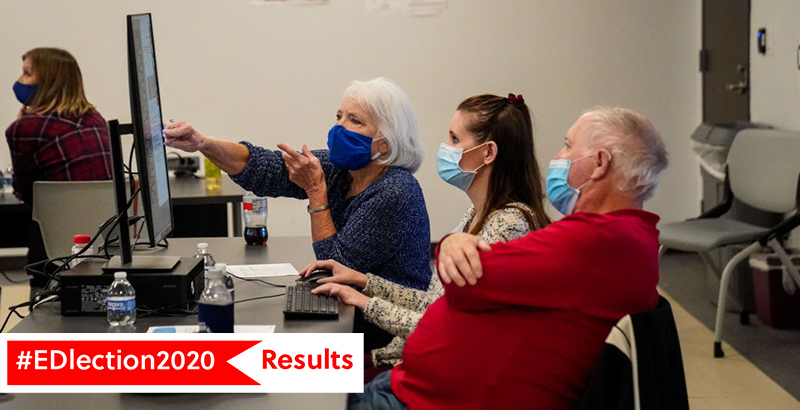From School Board to the White House, Gwinnett County’s Vote Falls Under National Microscope

Updated November 9
After almost a week of counting absentee and provisional ballots, Mary Kay Murphy, longtime incumbent board member for the Gwinnett County Public Schools, officially defeated challenger Tanisha Banks, a special education teacher at one of the district’s alternative schools.
2020’s KEY EDUCATION VOTES: See our full coverage of the 46 races that could reshape America’s schools following Election Day — and get the latest updates on state policies and students’ challenges during the pandemic by signing up for The 74 Newsletter.
Georgia’s Gwinnett County not only held a closely-watched school board race this election, it’s also under the national microscope with a razor-close presidential election forcing a recount and more than 3,500 absentee ballots yet to be tallied.
To Democrats running for a seat on the county’s five-member school board, however, those uncertainties could change the outcome of one of the races and flip the makeup from one nonwhite member to four.
“Gwinnett County is tracking nationally. The absentee ballots are predominantly Democratic,” said Tarece Johnson, a Black board member-elect who will fill the seat of 47-year member Louise Radloff, who she defeated in the June primary. Johnson ran unopposed.
By Wednesday morning, with all precincts reporting, incumbent Mary Kay Murphy led challenger Tanisha Banks, a Black special education teacher at one of the district’s alternative schools, with just 50.81 percent of the vote.
Murphy, who has been on the board since 1997, has assumed victory, saying that in spite of a divisive campaign that saw conservatives label challengers as radicals, she was “confident that we will find the best in each board member and in our ability to work together.”
“Campaigning is one thing,” she said. “Governing is another.”
Banks, however, posted on her Facebook page that due to the outstanding votes, she’s not conceding defeat.
“Waiting on certification of all votes,” she wrote. “You all know I am all about facts, figures and data. When you talk the talk, you must walk the walk!”
The local paper called the race for Murphy and Watkins Wednesday, but the Atlanta Journal-Constitution reported the county was having trouble counting absentee ballots.
Johnson said she was hoping the results would tip in Banks’s favor, noting that her perspective as a teacher would be helpful in a district that is nationally acclaimed but has experienced significant demographic shifts.
“She knows the players, more than anyone,” she said.
In the third race, Karen Watkins, a multiracial mother of two students in Gwinnett schools, defeated incumbent Carole Boyce with almost 59 percent of the vote. Boyce has served since 2005 in the district known for stable leadership.

For now, Johnson and Watkins will join Everton Blair, a graduate of Gwinnett schools elected in 2018 as the board’s first Black member.
Since 2010, the district has twice won the Broad Prize for Urban Education, presented to districts that have high overall performance while also narrowing racial and socioeconomic achievement gaps.
Though the district still performs above state averages on state tests, the Democratic candidates were among those calling for greater attention to lingering racial disparities in achievement and discipline.
Whether the board has three Black members or four, the dynamic between them and longtime Superintendent J. Alvin Wilbanks, who has led the district for 24 years, will likely change.
Earlier this year, Wilbanks’s contract was renewed for two more years, but he has said that staff members in the district are anxious about changes that could be coming. Already, Berney Kirkland, the superintendent’s longtime chief of staff and a former spokesperson for the district, announced her retirement.
Wilbanks said recently that he tries to stay out of board politics as much as he can, but that he hopes the new and current members will “continue to be a board that people respect.”
2020’s KEY EDUCATION VOTES: See our full coverage of the 46 races that could reshape America’s schools following Election Day — and get the latest updates on state policies and students’ challenges during the pandemic by signing up for The 74 Newsletter.
Get stories like these delivered straight to your inbox. Sign up for The 74 Newsletter

;)
